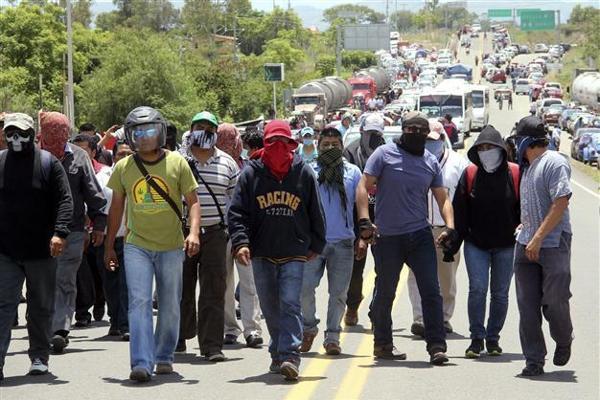Murders blight Mexico elections as government fails on security
ACAPULCO – Reuters


Members of the teacher's union CNTE block access to the petrol storage and distribution facility of Mexican state-owned oil company Pemex in Oaxaca, Mexico, June 4, 2015. Reuters Photo
Violence in the run-up to Mexico’s mid-term elections this weekend has killed at least seven candidates and forced another 20 out of the race, battering the government’s record on law and order.Drug gangs battling for control of Pacific coast trafficking routes have murdered or intimidated candidates, while militant teachers opposed to education reforms have threatened to sabotage voting stations in much of southwestern Mexico.
The violence flies in the face of President Enrique Pena Nieto’s pledge when he took office in December 2012 that his government would restore order to the country.
Fear has hamstrung candidates and voters alike across vast swaths of Mexico.
“I watch where I go, who I go with, and when I go,” Hector Astudillo, gubernatorial candidate for Pena Nieto’s ruling party in the state of Guerrero, said in the beach resort of Acapulco, one of Mexico’s most violent cities.
Guerrero, where 43 trainee teachers were abducted and almost certainly massacred last year by a drug cartel in league with local police, has been hardest hit by the electoral violence, in spite of pledges by Pena Nieto to restore order there.
In Chilapa, a few miles east of the college where the 43 trainee teachers studied, the PRI candidate for mayor was shot dead by armed men at the start of May. To the northeast, in Ahuacuotzingo, a woman running for mayor for a rival party was decapitated by suspected drug gangsters earlier in the race.
At least 20 other people went missing in May in Chilapa. After the murder of PRI mayoral candidate Ulises Fabian Quiroz campaigning all but petered out in the lawless area where drug trafficking has long been a favored escape route from poverty.
Along with the seven candidates, at least nine campaign officials have been killed in different areas of the country.
“These are the dirtiest elections since the advent of democracy in Mexico,” said Raul Benitez, a security expert at the National Autonomous University of Mexico.
Still, in the legislative elections on June 7, polls forecast the ruling Institutional Revolutionary Party, or PRI, should retain a slim working majority in the lower house of Congress, partly as the main opposition parties are riven by division.
Pena Nieto is a few seats short of a majority in the Senate, which is not up for re-election until 2018.
Under his presidency, the murder rate has fallen in troubled parts of northern Mexico, but violence has jumped in western areas, including the country’s second biggest city, Guadalajara.
